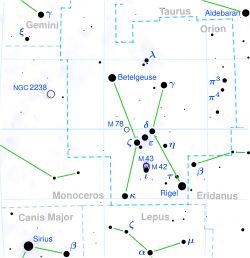Rigel


Rigel is a hot supergiant star in the Milky Way galaxy. It is a blue-white supergiant. It is in the constellation Orion.
Rigel is much larger than our Sun. It is 78 times the Sun's radius, with a diameter of more than 100 million kilometers, but it's mass is 21 times more massive than our sun. It's a temperature of 12100 Kelvin, which causes the star to glow about 120 000 times brighter than the Sun. [1]Rigel is 864 light-years (8.2 quadrillion km) from Earth in Orion. Because it is near the equator, Rigel is seen from Earth as a small, bluish circle on clear nights from both hemispheres.
Stellar system
[change | change source]Rigel appears to be as a single star, but in fact it's a stellar system of at least four stars. That include Rigel A, Rigel Ba, Rigel Bb and Rigel C. Rigel Ba and Bb orbits around each other every 9.8 days, while Rigel C orbits around Rigel B binary every 63 years. The distance from Rigel A and BC is ~2 200 AU, so the orbital period of each other is ~24 000 years. Rigel Ba, Bb and C have a mass of 3.84; 2.94; and 3.84 solar masses, and therefore they're B-type main sequence stars.[2]
Fate
[change | change source]Rigel pulsates.[3] The color of this star is bluish-white, hotter than a star with a yellow color. It will use its energy quickly. The Sun uses the same gases as Rigel; hydrogen and helium make it shine. When Rigel loses its fuel inside the very hot core, it will blow up into the red supergiant stage of its life and explode in a supernova. A black hole or a neutron star might be left.
References
[change | change source]- ↑ "Rigel (Beta Orionis) Facts: Size, Mass, Luminosity, Name, Orion". Star Facts. admin. 17 September 2019. Retrieved September 17, 2019.
- ↑ "Rigel (Beta Orionis) Facts: Size, Mass, Luminosity, Name, Orion". Star Facts. admin. 17 September 2019. Retrieved September 17, 2019.
- ↑ "Rigel (Beta Orionis) Facts: Size, Mass, Luminosity, Name, Orion". Star Facts. admin. 17 September 2019. Retrieved September 17, 2019.
